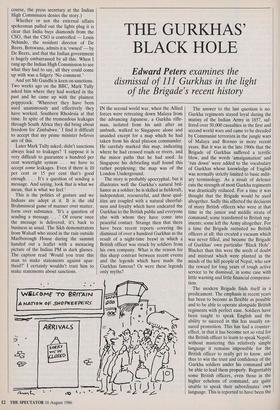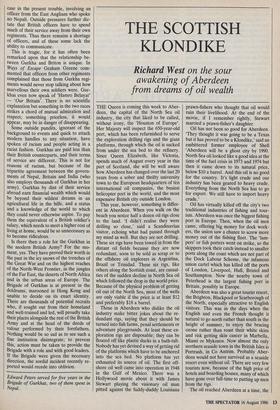THE GURKHAS' BLACK HOLE
Edward Peters examines the
dismissal of 111 Gurkhas in the light of the Brigade's recent history
IN the second world war, when the Allied forces were retreating down Malaya from the advancing Japanese, a Gurkha rifle- man, isolated from his unit after an ambush, walked to Singapore alone and unaided except for a map which he had taken from his dead platoon commander. He carefuly marked this map, indicating where he had crossed roads or rivers, and the minor paths that he had used. In Singapore his debriefing staff found this rather perplexing; the map was of the London Underground.
The story is probably apocryphal, but it illustrates well the Gurkha's natural bril- liance as a soldier; he is skilled in fieldcraft, independent, resourceful, and these qual- ities are coupled with a natural cheerful- ness and loyalty which have endeared the Gurkhas to the British public and everyone else with whom they have come into peaceful contact. Strange then that there have been recent reports covering the dismissal of over a hundred Gurkhas as the result of a night-time brawl in which a British officer was struck by soldiers from his own company. What is the reason for this sharp contrast between recent events and the legends which have made the Gurkhas famous? Or were these legends only myths? The answer to the last question is no. Gurkha regiments stayed loyal during the mutiny of the Indian Army in 1857, suf- fered over 50,000 casualties in the first and second world wars and came to be dreaded by Communist terrorists in the jungle wars of Malaya and Borneo in more recent years. But it was in the late 1960s that the Brigade of Gurkhas suffered a terrific blow, and the words 'amalgamation' and 'run down' were added to the vocabulary of Gurkhas whose knowledge of English was normally strictly limited to basic milit- ary terminology. As a result of defence cuts the strength of most Gurkha regiments was drastically reduced. For a time it was thought that the Bripde would be axed altogether. Sadly this affected the decisions of many British officers who were at that time in the junior and middle strata of command; some transferred to British reg- iments; some left the Army altogether. For a time the Brigade recruited no British officers at all; this created a vacuum which was never filled, and became the Brigade of Gurkhas' own particular 'Black Hole'. Blacker than this were the seeds of doubt and mistrust which were planted in the minds of the hill people of Nepal, who saw the reward for long years of tough active service to be dismissal, in some case with little warning and little financial compensa- tion.
The modern Brigade finds itself in a predicament. The emphasis in recent years has been to become as flexible as possible and to be able to operate alongside British regiments with perfect ease. Soldiers have been taught to speak English and the ability to succeed in this has usually en- sured promotion. This has had a counter- effect, in that it has become not so vital for the British officer to learn to speak Nepali; without mastering this relatively simple language it remains impossible for the British officer to really get to know, and thus to win the trust and confidence of the Gurkha soldiers under his command and be able to lead them properly. Regrettably some British officers, even those in the higher echelons of command, are quite unable to speak their subordinates' own language. This is reported to have been the case in the present trouble, involving an officer from the East Anglians who spoke no Nepali. Outside pressures further dic- tate that British officers have to spend much of their service away from their own regiments. Thus there remains a shortage of officers, and of these some lack the ability to communicate.
This is tragic, for it has often been remarked upon that the relationship be- tween Gurkha and Briton is unique. In Ways of Escape Graham Greene com- mented that officers from other regiments complained that those from Gurkha regi- ments would never stop talking about how marvellous their own soldiers were. Gur- khas even now speak of `Hamro Belayat' — 'Our Britain'. There is no scientific explanation but something in the two races strikes a chord of mutual admiration and respect; something priceless, it would appear, may be in danger of disappearing.
Some outside pundits, ignorant of the background to events and quick to attach modern handles to any situation, have spoken of racism and people acting in a racist fashion. Gurkhas are paid less than their British counterparts, and their terms of service are different. This is not for reasons of racism, but because of the tripartite agreement between the govern- ments of Nepal, Britain and India (who also employs thousands of Gurkhas in her army). Gurkhas by dint of their service abroad earn financial wealth which would be beyond their wildest dreams in an agricultural life in the hills, and a status and a knowledge of the world to which they could never otherwise aspire. To pay them the equivalent of a British soldier's salary, which needs to meet a higher cost of living at home, would be so unnecessary as to become ridiculous.
Is there then a role for the Gurkhas in the modern British Army? For the mo- ment, yes. They have proved their worth in the past in the icy snows of the trenches of the Great War and on the highest reaches of the North-West Frontier, in the jungles of the Far East, the deserts of North Africa and in the urban areas of Europe. The Brigade of Gurkhas is at present in the doldrums, marooned in Hong Kong and unable to decide on its exact identity. There are thousands of potential recruits who, if sought out from their homeland and well-trained and led, will proudly take their places alongside the rest of the British Army and at the head of the deeds of valour performed by their forefathers. Nothing would be so sad as to see such a fine institution disintegrate; to prevent this, action must be taken to provide the Brigade with a role and with good leaders. If the Brigade were given the necessary direction, the sordid incident recently re- ported would recede into oblivion.
Edward Peters served for five years in the Brigade of Gurkhas, two of them spent in Nepal.











































 Previous page
Previous page